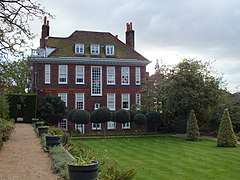George Baillie-Hamilton, Lord Binning
Brigadier-General George Baillie-Hamilton, Lord Binning, CB, MVO, DL (24 December 1856 – 12 January 1917) was a British Army officer; he was styled "Lord Binning" as a courtesy title.
Lord Binning George Baillie-Hamilton | |
|---|---|
| Born | 24 December 1856 |
| Died | 12 January 1917 (aged 60) |
| Allegiance | |
| Service/ | British Army |
| Rank | Brigadier-General |
| Unit | Royal Horse Guards |
| Battles/wars |
|
| Alma mater | Trinity College, Cambridge |
| Spouse(s) | Katharine Salting (married 1892) |
| Children | 3, including George Baillie-Hamilton, 12th Earl of Haddington |
He was born in 1856, the second child and eldest son of George Baillie-Hamilton-Arden, 11th Earl of Haddington and Helen Katherine, daughter of Sir John Warrender, 5th baronet of Lochend by Frances Arden. After an education at Eton and Trinity College, Cambridge,[1] he was commissioned in the Royal Horse Guards on 11 September 1880.
Baillie-Hamilton served with distinction in the 1882 Anglo-Egyptian War and the Nile Expedition of 1884. In 1889 he was appointed aide-de-camp to the Viceroy of India during the Black Mountain Expedition, being mentioned in despatches. From 1899 to 1903 he was commanding officer of the Royal Horse Guards. As such he was involved in the military arrangements for the Coronation of King Edward VII and Queen Alexandra in August 1902, and three days after the ceremony he was appointed a Member (4th class) of the Royal Victorian Order (MVO) on 12 August 1902, during a private audience with King Edward VII.[2][3] He retired from the army in 1907, but remained in the Territorial Force as commanding officer of the Lothians and Border Horse, and served as His Majesty's Lieutenant of the County of Berwick from 1901 until he died.[4]
He was appointed a temporary Brigadier-General in December 1915, on receiving command of 41st Brigade in 14th (Light) Division. He remained in command until April 1916, returning to Britain to take charge of the 11th Mounted Brigade.

In 1892 he had married Katharine Salting, with whom he had two sons and a daughter. He died, aged sixty, five months before his father so did not inherit the title and possible election in the House of Lords (as a Scottish Representative Peer) as the Earl of Haddington; instead, it passed to his eldest son, George Baillie-Hamilton. His widow, Lady Binning, donated Fenton House in Hampstead, London to the National Trust on her death in 1952.
References
- "Baillie-Hamilton, George (Lord Binning) (BLY875G)". A Cambridge Alumni Database. University of Cambridge.
- "Court Circular". The Times (36845). London. 13 August 1902. p. 8.
- "No. 27467". The London Gazette. 22 August 1902. pp. 5461–5462.
- "No. 27264". The London Gazette. 8 January 1901. p. 158.
- Bibliography
- Obituary: p. 154, The Annual Register: a review of public events at home and abroad, for the year 1917. London: Longmans, Green and Co. 1918.
- Lord George Baillie-Hamilton Binning, Centre for First World War Studies.
External links
| Wikisource has original text related to this article: |
- http://www.leighrayment.com/lords.htm%5B%5D
- http://www.thepeerage.com/
- http://www.stirnet.com/
- http://www.burkespeerage.com/
| Honorary titles | ||
|---|---|---|
| Preceded by The Earl of Lauderdale |
Lord Lieutenant of Berwickshire 1901–1917 |
Succeeded by Charles Balfour |